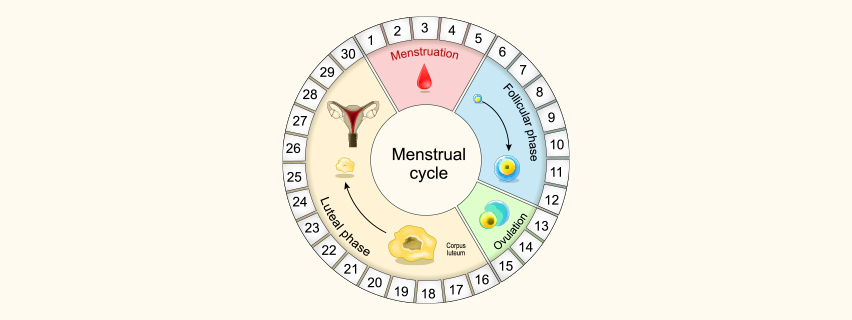Can You Take a Pregnancy Test While on Your Period?
Missing a period or noticing unusual bleeding often triggers worry and curiosity about pregnancy. For many, the first instinct is to grab a pregnancy test kit and check right away. But what if you’re already on your period? Does that make a test unreliable? This is one of the most common concerns women face, especially when menstrual cycles feel irregular or symptoms like nausea, fatigue, or tender breasts occur.
The question that often causes doubt whether to test for pregnancy during periods is more common than you might think. Many assume that period bleeding is a definite sign that pregnancy isn’t possible, but the reality is more complicated. Early pregnancy spotting can resemble a light period, and some women even experience what feels like menstruation during the first month after conception.
Hence, it is important to understand how pregnancy tests work, when to use them, and what the results mean is so important.
Also Read – What are the Symptoms of Pregnancy
Can We Test Pregnancy During Periods?
The simple answer to this question is, yes, you can. If you suspect pregnancy, you can take a test even if you are bleeding. A pregnancy detection kit works by identifying the hormone human chorionic gonadotropin (hCG) in your urine. This hormone is released soon after a fertilized egg attaches to the uterine wall. If hCG is present, the test will show a positive result regardless of whether you’re on your period or not.
However, the confusion comes from the bleeding itself. Most of the time, bleeding during your expected period window is just menstruation. But in some cases, what seems like a period could actually be implantation bleeding or other pregnancy-related spotting. Implantation bleeding is usually lighter than a regular period and occurs when the fertilized egg attaches to the uterus.
While it’s completely fine to test during periods, keep in mind that heavy menstrual flow can sometimes dilute the urine sample or create uncertainty in interpretation. To avoid such confusion and clear the doubt, it’s best to use the first morning urine for the test, as it is most concentrated.
Will the Pregnancy Test During Period Work?
A pregnancy test during menstruation will still work effectively because the test doesn’t measure blood flow; it measures hCG in urine. Menstrual blood does not interfere with the chemical process of the strip or digital test. So, technically, yes, the test works.
But the challenge generally lies in timing. If you test too early, even if you are pregnant, the hCG levels may not be high enough to show up. This is why many experts suggest waiting at least a week after your missed period for the most accurate results.
If you are bleeding heavily but still have symptoms of pregnancy, you may want to consider retesting a few days later or consulting a doctor. It’s also important to keep in mind that irregular bleeding could indicate other health conditions like hormonal imbalance, ovarian cysts, or thyroid issues, not just pregnancy.
Also Read – Home Pregnancy Test: What, How to & Types
When Is the Best Time to Use the Pregnancy Test Kit?
To get the most reliable results from a pregnancy test kit, timing matters. Here’s how you can decide:
- Best time of day: Use the first urine of the morning. It’s more concentrated and more likely to show accurate hCG levels.
- Best time in your cycle: The ideal time to test is a week after your missed period. By then, hCG levels are usually high enough to be detected.
- If you test early, you can still get a result, but it might be negative even if you’re pregnant (called a false negative). That’s why repeating the test after a few days is advised if your suspicion is strong.
- If bleeding is unusual: If your “period” feels lighter, shorter, or different, testing immediately is worth it to rule out pregnancy.
What Are the Possible Reasons for Bleeding During Early Pregnancy?
Bleeding in early pregnancy can feel like a period, but it may be linked to different causes. Here are some possible reasons explained:
- Implantation bleeding – This happens when the fertilized egg attaches to the uterus lining. It usually occurs around the time your period is due and can be mistaken for light menstruation.
- Hormonal fluctuations – Pregnancy hormones can sometimes cause spotting in the first trimester, especially around the time your period would occur.
- Cervical changes – Increased blood flow to the cervix during pregnancy makes it more sensitive. Activities like intercourse or even a pelvic exam can trigger light bleeding.
- Subchorionic hemorrhage – A small collection of blood between the placenta and the uterine wall may cause spotting or bleeding. It usually resolves, but should be monitored.
- Ectopic pregnancy – In rare cases, bleeding may signal that the embryo has implanted outside the uterus, a serious condition requiring medical attention.
- Miscarriage warning – Unfortunately, heavy bleeding in early pregnancy can also indicate a miscarriage, especially if accompanied by cramps or clots.
- Infections – Vaginal or cervical infections can sometimes cause spotting, unrelated to the pregnancy itself.
- Unknown causes – Sometimes, light bleeding occurs with no clear reason and the pregnancy progresses normally.
What Should You Do If You Think You Are Pregnant but Your Period Has Started?
This situation can be confusing. If you feel pregnant but bleeding begins, here’s what you should do:

- Consult your doctor – Bleeding during pregnancy with or without pain. The condition needs to be accessed by Gynecologist before declaring it normal or non-consequential
- Take a pregnancy test – Even during your period, the test can confirm whether hCG is present.
- Observe the bleeding pattern – Check if it is as heavy as your normal period, or lighter/shorter. Implantation or early pregnancy bleeding often feels different.
- Repeat the test – If the first result is unclear, retest after a few days.
- Avoid assumptions – A period-like flow usually means menstruation, but exceptions exist. Only testing and medical advice can confirm.
Pregnancy and menstruation often overlap in ways that confuse. Women frequently wonder whether they can take a pregnancy test during their period, and the answer is yes. A pregnancy test kit functions by detecting hCG, not by analyzing bleeding. Therefore, even during menstruation, results are possible and usually reliable.
Unusual bleeding during early pregnancy may have different causes, ranging from harmless implantation spotting to medical conditions requiring attention. If in doubt, using a pregnancy detection kit is the first step, but medical consultation ensures clarity and safety.
Frequently Asked Questions
Q. Can we use Prega News during periods?
Yes, Prega News works by detecting hCG in urine. Menstrual blood does not affect the result, though it’s best to collect a clean urine sample for accuracy.
Q. Does a period always mean I’m not pregnant?
No, not necessarily the period means not pregnant. Some women experience spotting or light bleeding in early pregnancy that can be mistaken for a period.
Q. When should I use a pregnancy test kit for the best results?
A week after your missed period is best. Use morning urine for higher accuracy.
Q. Can heavy bleeding still mean pregnancy?
Heavy bleeding usually indicates a period or miscarriage, but rare exceptions exist. Always confirm with a test or a doctor visit.
Q. How reliable is a pregnancy detection kit?
Most kits claim 97–99% accuracy if used correctly and at the right time. However, it is always advised to follow up with a doctor regarding confirmation.













































Leave a comment